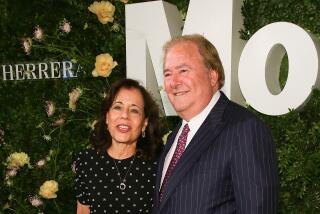Global Crossing Fraud Lawsuit Can Proceed
- Share via
Gary Winnick, the founder and former chairman of Global Crossing Ltd., must defend against claims that he and 22 former executives fraudulently misrepresented the fiber-optic company’s finances, a federal judge ruled.
A group of banks led by J.P. Morgan Chase & Co. sued Winnick in October for $1.7 billion, claiming he and the other ex-executives engaged in a “massive scam” to conceal Global Crossing’s decline so it could borrow $2.25 billion two months before its collapse in 2002.
U.S. District Judge Gerard E. Lynch in New York on Tuesday denied the defendants’ request to throw out the suit, saying it wasn’t clear whether the banks should have uncovered the alleged fraud. The judge’s refusal to dismiss the fraud claims means Winnick and the others may face a jury trial.
The judge dismissed negligent-misrepresentation claims against Winnick and the other defendants, saying the banks failed to show that the defendants had any special relationship with the banks that would create heightened legal responsibility.
Gary Naftalis, a lawyer representing Winnick, didn’t return a call seeking comment. J.P. Morgan’s lawyer, Allan S. Brilliant, declined to comment.
Global Crossing’s executive offices were once in Beverly Hills. Since emerging last year from bankruptcy protection, the Bermuda-based company has operated from New Jersey.
Winnick, whose Global Crossing shares once were worth $4.5 billion, founded the company in 1997.
The company accumulated $12.4 billion in debt building a worldwide fiber optic network. Global Crossing leased space on its 27-nation network to rivals from which it rented capacity at the same time, helping both parties boost reported revenue. The transactions were the subject of probes by the Securities and Exchange Commission and the Justice Department.








